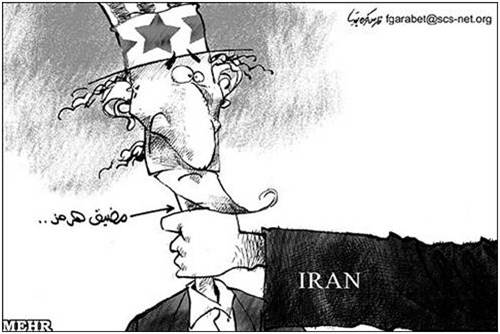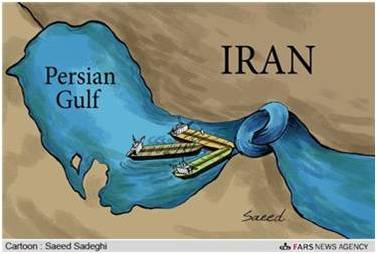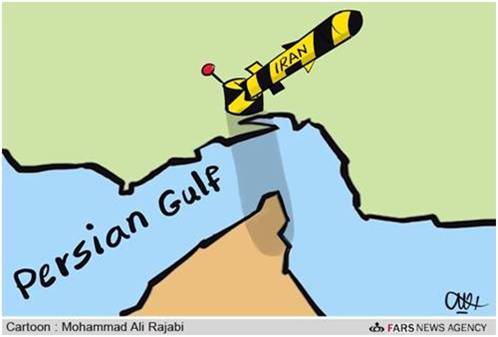THE NATIONALIST VALUE OF WAR GAMES: IRAN'S NAVAL EXERCISES IN THE PERSIAN GULF

Number 48 ● 23 January 2012
THE NATIONALIST VALUE OF WAR GAMES: IRAN'S NAVAL EXERCISES IN THE PERSIAN GULF
Chelsi Mueller*
In a display of nationalist pride, Iranian lawmakers and media have touted Iran's recent naval war games as a demonstration of Iran's naval prowess and regional dominance (Mehr, 22 December 2011). Televised footageof naval exercises in the Persian Gulf came on the heels of several threats by Iranian leaders to close the Strait of Hormuz if sanctions were imposed on Iran's crude oil exports (Resalat, 31 December 2011). The Islamic Republic of Iran considers the Strait of Hormuz, a narrow transit passage for about one-fifth of the world's oil, to be its strategic area of influence and resents the presence of foreign warships in the area.

Threats to close the Strait of Hormuz, which came from Iranian political and military figures, including Vice President Mohammad-Reza Rahimi and Admiral Habibollah Sayyari, gave way to a flurry of media speculation in the West about whether Iran has the capability to close the strait and what the repercussions could be (Press TV, 3 January 2012). The American Chairman of the Joint Chiefs of Staff, General Martin Dempsey, in an interview said that Iran does have the capability to close the strait, but not for long, since the U.S. would immediately take action to re-open it ("Face the Nation," 8 January 2012). A closure of even a few days would cause a disruption in 33% of the world's seaborne oil transit and could trigger a spike in oil prices that would exacerbate economic woes worldwide.
While Iran's military muscle flexing is designed to send signals to the United States and international community, it also serves a domestic purpose—to distract from the swelling economic malaise and depreciation of the leadership's legitimacy by kindling national pride. Iranians have long viewed the Persian Gulf as—exactly what its name implies—Persian. And Iran's ability to control naval activity in the Persian Gulf is viewed as a test of Iran's independence and sovereignty.
Another round of war games scheduled to begin on January 27th, bear out the convergence of nationalist and religious ideology in the Islamic Republic. The upcoming Revolutionary Guard (IRGC) naval exercise, dubbed "the Great Prophet" is not deficient in religious symbolism: with the American Fifth Fleet based in Bahrain, the IRGC navy is, in fact, on the frontline of resistance against the U.S. and its allies, called the "Great Satan," or the "global arrogance." In Iranian media, the "global arrogance" is said to be suffering defeat and retreating from the region owing to the wave of Islamic awakening (IRNA, 5 January 2012).
The provocation of military tension in the Persian Gulf on the part of Iran's leaders also appeals to nationalistic pride. In many ways, the Islamic Republic's challenge to American hegemony in the Gulf mirrors Iran's challenge to British hegemony under Reza Shah Pahlavi (1925-1941). Reza Shah challenged the British position in the Persian Gulf, and caused them to alter some of their policies. He deployed army garrisons to the Persian Gulf ports, introduced a new Iranian navy, revived Iran's claim to Bahrain and the islands near Hormuz and induced the British to withdraw its naval bases from Qeshm and Hengam. He also introduced the Territorial Waters Act in 1934 which prevented foreign ships from entering Iran's territorial waters at will (which the British had been accustomed to doing). These efforts to loosen the grip of the British in and around Iran's territorial waters were applauded by most politically aware Iranians especially those residing in the port towns of the Persian Gulf. Today, Iranian naval forces are significantly outgunned by Western flotillas, not the least of which is the American Fifth Fleet stationed at Bahrain. Iran's leaders have resorted to trying to cultivate popular demand for foreign forces to leave the Gulf. According to Iran's media, the American military force in the region is "temporary" and "Iran will soon replace America as the most powerful military force in the Persian Gulf" (Fars News Agency, 29 July 2011).

Today, the reliance of the Arab Gulf regimes on the protection of a hegemonic foreign power remains the largest obstacle to Iran obtaining its long sought position in the Persian Gulf. Kuwait, Bahrain, Qatar, the UAE and Oman all host US bases or military installations. Iranian leaders have repeatedly tried to persuade the Arab Gulf states that the region would be more peaceful if foreign forces are withdrawn, and they have sought to demonstrate that Iran, with the support of the Arab Gulf states, is capable of providing security for the Persian Gulf.
The capacity of flamboyant naval exhibition to stir up national pride remains a potent tool in the hands of Iran's leaders: whereas Reza Shah showcased Iranian naval power by inviting the merchants of Bushire and Lingah to tour Iran's new gun boats, the Islamic Republic of Iran loops video footage of missiles blasting over the ocean, submarines surfacing, fast torpedo boats practicing attacks, and helicopters deploying divers and commandoes (Al-Alam TV News, in BBC Worldwide Monitoring, 4 January 2012). The extent to which this tool is effective is debatable. Politically aware Iranians are suspicious of the media. Nevertheless, Iranians, by and large, support Iran's aspiration to be the dominant power in the Persian Gulf waters. Even Iranians who do not have warm feelings for the regime can rally around Iran's legitimate rights to protect its own oil resources and its legitimate position in the Persian Gulf.
Constant media coverage of foreign naval activity in the Gulf doesn't allow the Iranian people to forget about the threat of encirclement, but paradoxically, the Iranian navy is depicted as being completely in control. "The arrival of American, British, French and Russian warships to the Persian Gulf has for years been routine and shows their greed for oil," said Major General Hassan Firouzabadi, "but the Iranian military monitors the Persian Gulf" and "allows ships to enter and exit the Gulf" only after inspecting them, he said (Fars News Agency, 31 January 2011). Similarly, during the recent "Velayat-90" exercises, an American naval carrier passed through the Strait of Hormuz. The military issued video footage of the carrier, saying that they tracked its movements, and warned it not to return (Al-Alam TV News, in BBC Worldwide Monitoring, 4 January 2012). "Today, the Islamic Republic of Iran has full control over this region and controls all the movements in the area," said IRGC Admiral Ali Fadavi (Fars News Agency, 5 January 2012).
The IRGC naval exercises, scheduled to begin on January 27th, will reportedly focus on closing the Strait of Hormuz within the shortest time possible (Press TV, 8 January 2012). American naval commanders worry that Iran's war games could turn into more than just games (see for example Admiral Greenert's comments to the Center for a New American Security, 10 January 2012). Iranian nationalism remains a potent force at the heart of Iranian ambitions in the Persian Gulf, and when Iran's leaders appeal to nationalist pride by issuing flamboyant threats, they diminish their own room for maneuver, and could be forced to react to the very passions that they create. The heightened military activity in the Persian Gulf, taken together with Iran's defiant pursuit of a nuclear weapon, the impending EU embargo on Iranian oil, Iran's threat of retaliation, and international ships put on warning—all of this increases the chances of an unplanned clash in the Persian Gulf waterway■

*Chelsi Mueller is a junior research fellow in the Center for Iranian Studies and a Ph.D. student in the Department of Middle Eastern and African History at Tel Aviv University.
T h e A l l i a n c e C e n t e r f o r I r a n i a n S t u d i e s ( A C I S )
Tel Aviv University, Ramat-Aviv 61390, Tel Aviv P.O.B. 39040, Israel
Email: IranCen@post.tau.ac.il Phone: +972-3-640-9510
F a x : + 9 7 2 - 3 - 6 4 0 - 6 6 6 5
Iran Pulse No. 48 ● January 23, 2012
© All rights reserved

